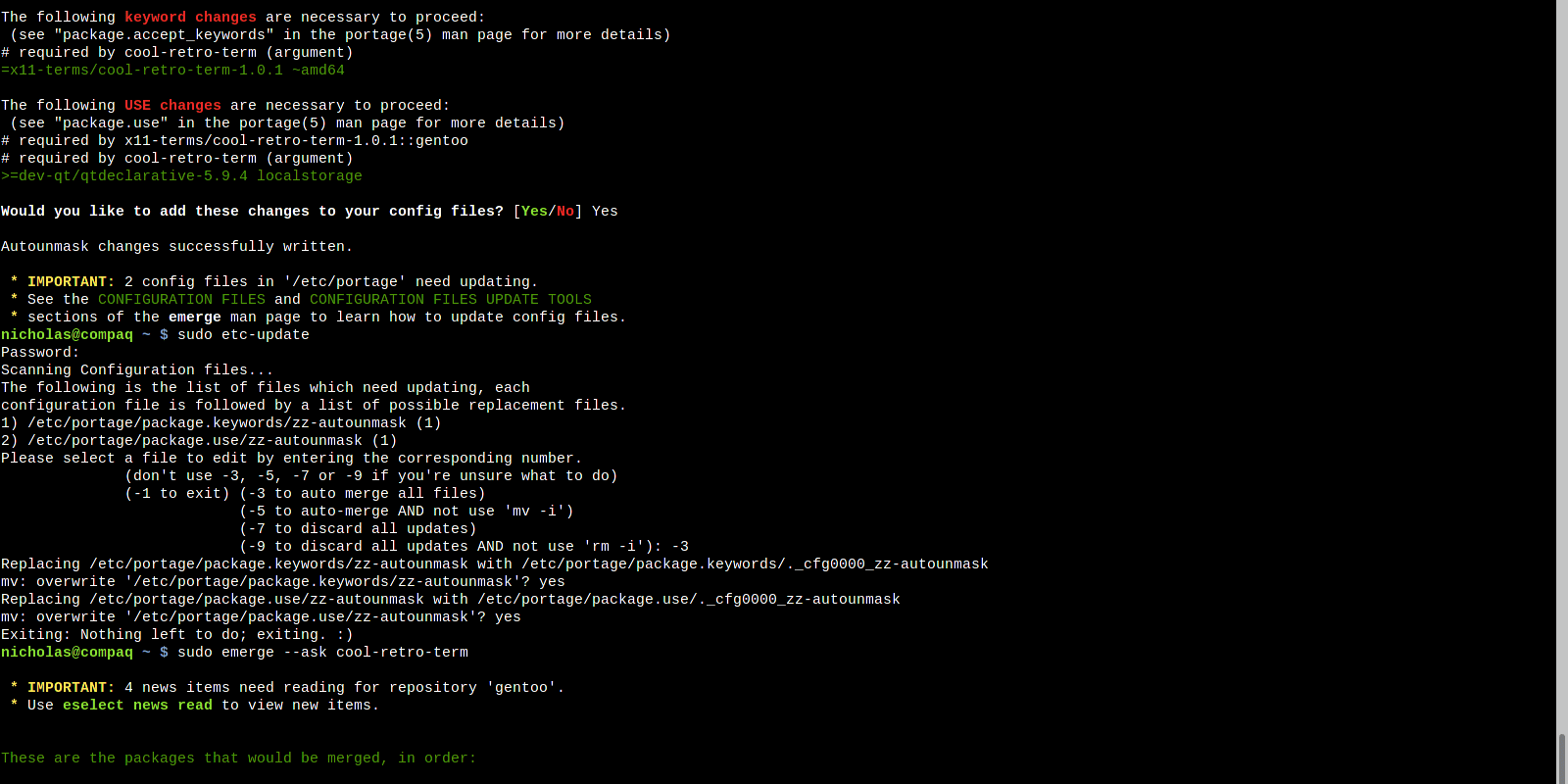Gentoo vs. Ubuntu: Performance and Usability in the Balance

The realm of Linux distributions is vast and multifaceted, with a multitude of options catering to diverse user needs. Among them, Gentoo and Ubuntu stand as two prominent contenders, each boasting unique strengths and trade-offs. In this comparative analysis, we delve into the performance and usability aspects of Gentoo and Ubuntu to determine which distribution reigns supreme in these critical areas.

Performance: A Battle of Optimization

Gentoo takes the performance crown, thanks to its unique compilation process. By compiling packages from source code, Gentoo grants users granular control over optimization flags and dependencies. This meticulous approach empowers users to tailor their system precisely to their hardware, resulting in lightning-fast performance. In contrast, Ubuntu’s pre-compiled packages prioritize convenience over performance, leading to a noticeable difference in speed when demanding applications are in play.
Usability: Convenience and User-Friendliness
Usability takes center stage in Ubuntu’s design philosophy. Its user-friendly graphical installer, extensive software repositories, and well-developed package management system make it a breeze to get up and running quickly. Gentoo, on the other hand, presents a steeper learning curve, requiring a deeper understanding of Linux and a hands-on approach to system configuration. Its complex compilation process can be daunting for novice users, potentially hindering the overall user experience.
Package Management: Granularity vs. Simplicity
Gentoo’s Portage package manager offers unparalleled granularity, allowing users to fine-tune package versions, flags, and dependencies with ease. This level of control empowers advanced users to customize their systems to an exceptional degree. However, for those prioritizing simplicity, Ubuntu’s user-friendly Software Center and apt package manager provide a more streamlined approach, making package management a less burdensome task.
Kernel: Flexibility and Optimization
Gentoo’s custom-built kernels add to its performance advantage, granting users the ability to configure every aspect of the kernel specifically for their hardware. This customization enables Gentoo to extract maximum performance from any system configuration. Ubuntu opts for pre-compiled kernels, favoring stability and compatibility over the flexibility offered by Gentoo’s custom kernels.
Conclusion: Tailoring the Choice to Your Needs
In the performance vs. usability debate, Gentoo and Ubuntu present contrasting choices. Gentoo emerges as the superior option for performance-conscious users seeking granular control over their systems. Its compilation-centric approach and custom kernel capabilities unlock exceptional speed and optimization. Ubuntu, on the other hand, reigns in the usability realm, providing a user-friendly experience with pre-compiled packages, extensive software repositories, and a beginner-friendly installer. The choice between Gentoo and Ubuntu ultimately hinges on the balance between performance and usability that best aligns with the user’s priorities and technical proficiency.## Gentoo Vs. Ubuntu: Performance And Usability At Stake
Executive Summary:
Gentoo and Ubuntu are two prominent Linux distributions that cater to distinct user needs. Gentoo emphasizes customization, performance, and a bleeding-edge software stack, while Ubuntu prioritizes ease of use, broad hardware support, and stability. This article delves into a detailed comparison of Gentoo vs. Ubuntu, examining their performance, usability, and suitability for various use cases.
Introduction
The choice between Gentoo and Ubuntu hinges on the user’s technical expertise, performance requirements, and desired level of control over the operating system. This comprehensive guide explores the key differences between these two distributions to help readers make an informed decision.
Performance
Customization and Optimization
- Gentoo: Enables fine-grained customization of the kernel, optimizing it for specific hardware and workloads.
- Ubuntu: Pre-configured with optimized default settings, but offers limited customization options.
Binary vs. Source Packages
- Gentoo: Distributes source code packages, allowing users to compile and optimize software for their specific system.
- Ubuntu: Uses precompiled binary packages, resulting in faster installation and reduced resource consumption.
Kernel
- Gentoo: Provides a wide range of kernel options, enabling users to choose the most suitable kernel for their needs.
- Ubuntu: Features a single, pre-configured kernel optimized for general-purpose use.
Package Management
- Gentoo: Employs the Portage package manager, allowing users to selectively install and update packages.
- Ubuntu: Utilizes the APT package manager, offering a vast repository of pre-compiled software and automatic updates.
Usability
User Interface
- Gentoo: Requires manual configuration of the desktop environment, providing greater flexibility but a steeper learning curve.
- Ubuntu: Comes pre-installed with a user-friendly graphical interface, simplifying installation and setup.
Software Availability
- Gentoo: Offers a smaller software repository than Ubuntu, focusing on stability and reliability.
- Ubuntu: Maintains a vast repository of software, including both stable and bleeding-edge applications.
Community Support
- Gentoo: Has a strong online community providing support and documentation for advanced users.
- Ubuntu: Boasts a larger community, including both experienced and novice users, offering a wide range of support resources.
Stability
- Gentoo: Requires more maintenance and troubleshooting due to its focus on customization and bleeding-edge software.
- Ubuntu: Known for its stability and reliability, making it suitable for production environments and general-purpose use.
Conclusion
Gentoo and Ubuntu cater to different user profiles. Gentoo is ideal for users seeking ultimate performance, customization, and flexibility. Conversely, Ubuntu is the preferred choice for users prioritizing ease of use, stability, and broad software availability. By weighing the performance and usability considerations outlined in this article, readers can determine which distribution best aligns with their needs and preferences.
Keyword Phrase Tags:
- Gentoo vs. Ubuntu
- Linux Distributions
- Performance
- Usability
- Customization


Ubuntu is superior than Gentoo. It has a larger community and better documentation, making it easier to use and troubleshoot.
I’m not convinced that Gentoo is worth the extra effort. Ubuntu is good enough for most people.
I’m curious about Gentoo, but I’m not sure if I’m ready to make the switch. I’ve heard it’s very difficult to use.
Gentoo is the best! It’s so much faster and more customizable than Ubuntu.
Oh, please. Gentoo is for nerds who have nothing better to do than compile their own kernels.
I love Gentoo. It’s the perfect distro for people who want to spend more time compiling their operating system than actually using it.
I’m not sure why anyone would choose Gentoo over Ubuntu. Unless they’re just really good at waiting for their computer to compile.
I think the choice between Gentoo and Ubuntu depends on what you’re looking for in a distro. If you want something that’s easy to use and has a lot of support, then Ubuntu is a good choice. If you’re willing to put in the time to learn how to use it, then Gentoo can be a very powerful and customizable distro.
At this time, Ubuntu is better than Gentoo for most people. Its the correct option for starting in the linux world and than see if i need to change to Gentoo.
I’ve used both Gentoo and Ubuntu, and I prefer Gentoo. It’s more flexible and gives you more control over your system.